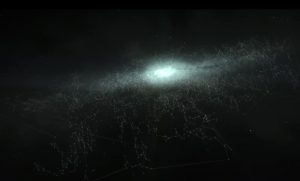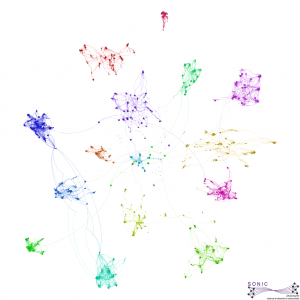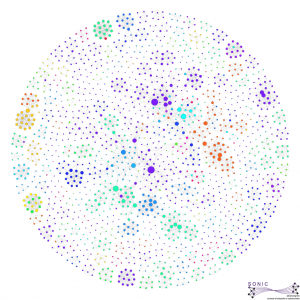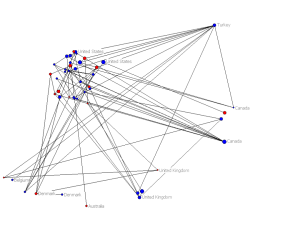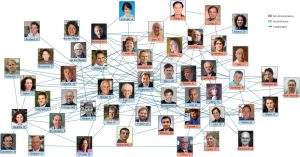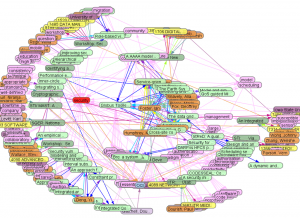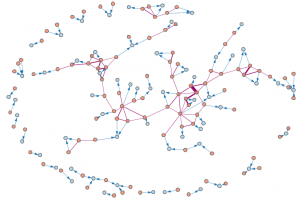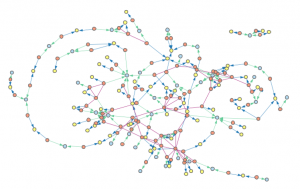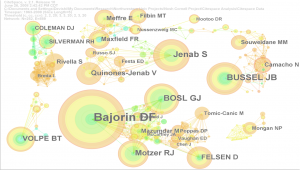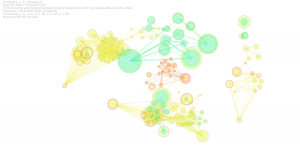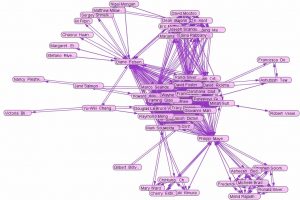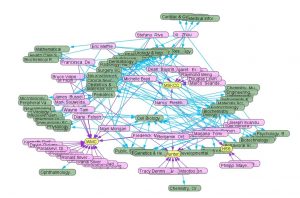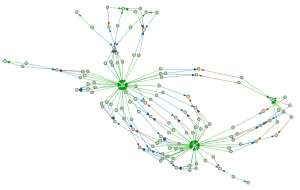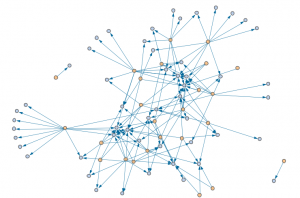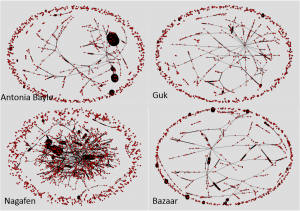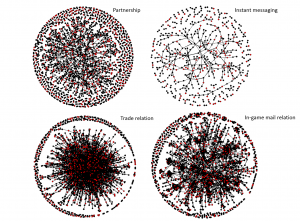Publication Ecosystems of Two Grant Proposal Teams
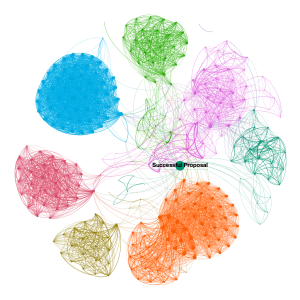
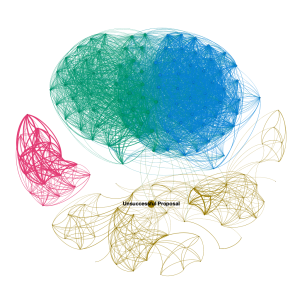
v
Description: The networks display the publication ecosystems corresponding to two different grant proposal teams – one that was successful in receiving funding and another that was unsuccessful. The largest node represents the proposal team of interest, and all other nodes represent a publication that was co-authored by members of the proposal team (first-order separation) or co-authored by co-authors of members of the proposal team (second-order separation), published prior to the proposal submission date. Colors represent differences in modularity (density of connections). Both proposal teams were composed of 6 investigators, however the unsuccessful proposal team was embedded in an ecosystem containing only 166 publication teams and 212 unique authors while the successful proposal team was embedded in an ecosystem containing 291 publication teams and 243 unique authors. As such, the successful proposal team was in a position of greater knowledge diversity than the unsuccessful proposal team.
Nodes:Largest node = Grant proposal team; All other nodes = Publication that was co-authored by members of the proposal team or co-authored by co-authors of the proposal team, published prior to the proposal submission date
Links: A proposal-publication or publication-publication shared at least one investigator/co-author in common
Credit: Neelam Modi
EVE online Star Systems
Description: The graph illustrates all stars (i.e. solar systems) in the online game EVE online and the transportation paths between them.
Node: A solar system in Eve online;
Link: Jump gates (or teleport path) between solar systems
Gates Project: Knowledge networks in Bihar, India
Description: Knowledge networks of government officials, development partner officials, and program employees in several districts in Bihar at the outset of a campaign to reduce the rates of infant mortality, fertility, and malnutrition and to increase immunization coverage.
Nodes: Health care workers and government officials in Bihar, India;
Links: Advice seeking relations
Oncofertility Co-Authorship 2010
Description: Co-authorship of researchers in oncofertility consortium.
Nodes: Researchers (color-coded by expertise and sized by numbers of publications);
Links: Co-authored in publications.
Friendship in SecondLife Teen Grid
Description: Friendship relations of teenagers in SecondLife colored by gender and grouped by country
Blue: Male
Red: Female
Size indicates age
Researchers Related to Keyword “Network”
Description: Researchers in Northwestern and their relation to the keyword “network”
Nodes with bigger labels have more research related networks
Nodes closer to each other have more collaborations
Collaborators in WebNetSci 2011
Description: Collaboration network of the participants of Web Science meets Network Science Workshop 2011
Nodes: Researchers (color coded by areas: blue – social science; red – non social science);
Links: Collaboration in publications
Security Related in NSF Cyber-Infrastructure Awards
Description: All proposals, PIs, programs, papers, and keywords related to the term security in NSF cyber-infrastructure related awards
Node: Red – focal keyword, blue – proposals, brown – PI/co-PIs, pink – keywords, Purple – institutions
Links: Associations between nodes
NUCATS Applicant Co-Authorship
Description: Co-author relations among all grant applicants for NU Clinical and Translational Sciences Institute
Nodes: Orange – researchers; blue – proposals
Links: Purple – co-authorship between researchers (line width indicates the number of papers co-authored); blue – researcher-proposal relations
NUCATS Applicants and Departments
Description: This graph shows the association of all proposals NUCATS received, and their authors and departments
Nodes: Yellow – proposals, orange – authors, blue – departments
Links: Blue – author-proposal relations; green – author-department relations; purple – co-authorship between authors.
CTSC: Co-Citation Network
Description: The co-citation network illustrating the researchers submitted proposals to Clinical and Translational Science Center in Cornell University, numbers of citations they received, and whether they are cited together in other publications.
Nodes: Researchers submitted proposals to Cornell CTSC (layers and sizes of nodes show their numbers of citations received from 1963 (inner) to 2008 (outer)
Links: Two researchers are cited together in other publications
CTSC: Co-Citation Network (No Labels)
Description: The co-citation network illustrating the researchers submitted proposals to Clinical and Translational Science Center in Cornell University, numbers of citations they received, and whether they are cited together in other publications.
Nodes: Researchers submitted proposals to Cornell CTSC (layers and sizes of nodes show their numbers of citations received from 1963 (inner) to 2008 (outer)
Links: Two researchers are cited together in other publications
CTSC: Author Keyword Sharing
Description: The similarity network illustrating whether there are common keywords shared in publications among the researchers submitted proposals to Clinical and Translational Science Center in Cornell University
Nodes: Researchers submitted proposals to Cornell CTSC.
Links: Two researchers shared common keywords in their publications
CTSC: Researchers and Subject Category
Description: CTSC researchers, their schools, and research subject categories
Nodes: Pink – researchers; green – subject categories; yellow – universities
Links: aAssociations between two types of nodes
CTSC: Awarded Proposals, PI’s, and Institutions
Description: Illustrate all awarded CTSC proposals in 2008 and their PIs and institutions.
Nodes: Green – awarded PI/co-PIs, brown – proposals ; blue – institutions
Links: Brown links – PI-proposal relations; blue – co-PI-proposal relations; green – author-institution relations
CTSC: Awardees and Their Subject
Description: Illustrate the specialties of all CTSC awardees in 2008
Nodes: Brown – awarded PI/co-PIs, blue – publication subject categories
Links: Published in the subject category
Everquest II: Player Trade Networks in Different Servers
Description: Player trading relations (e.g. exchanging items) in different game servers of EverQuest II
Nodes: Players
Links: Trading relations (link width indicating trading frequencies)
Everquest II: Networks
Description: Players partnership, IM, trade, and mail networks in EverQuest II
Nodes: Black – male player; Red – female players
Links: Relations

